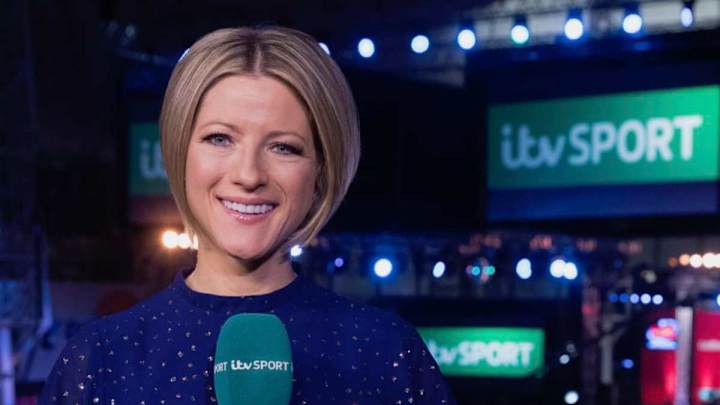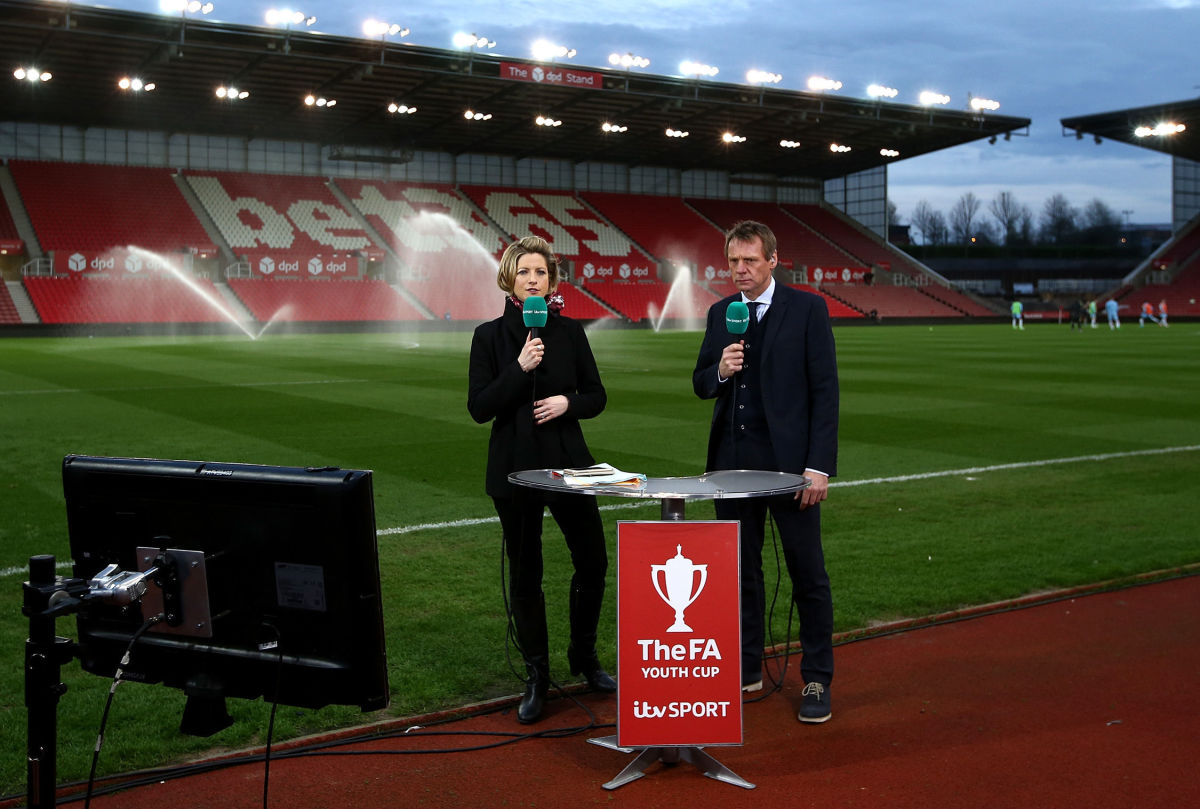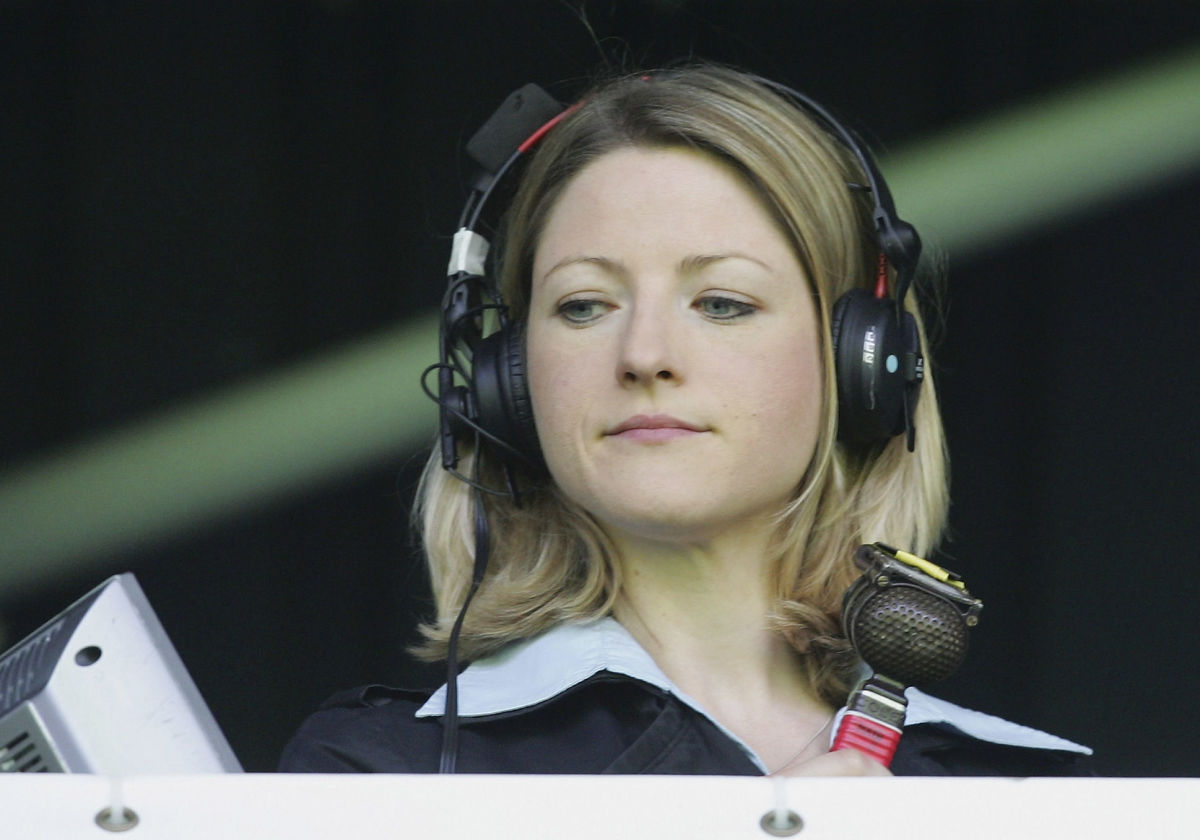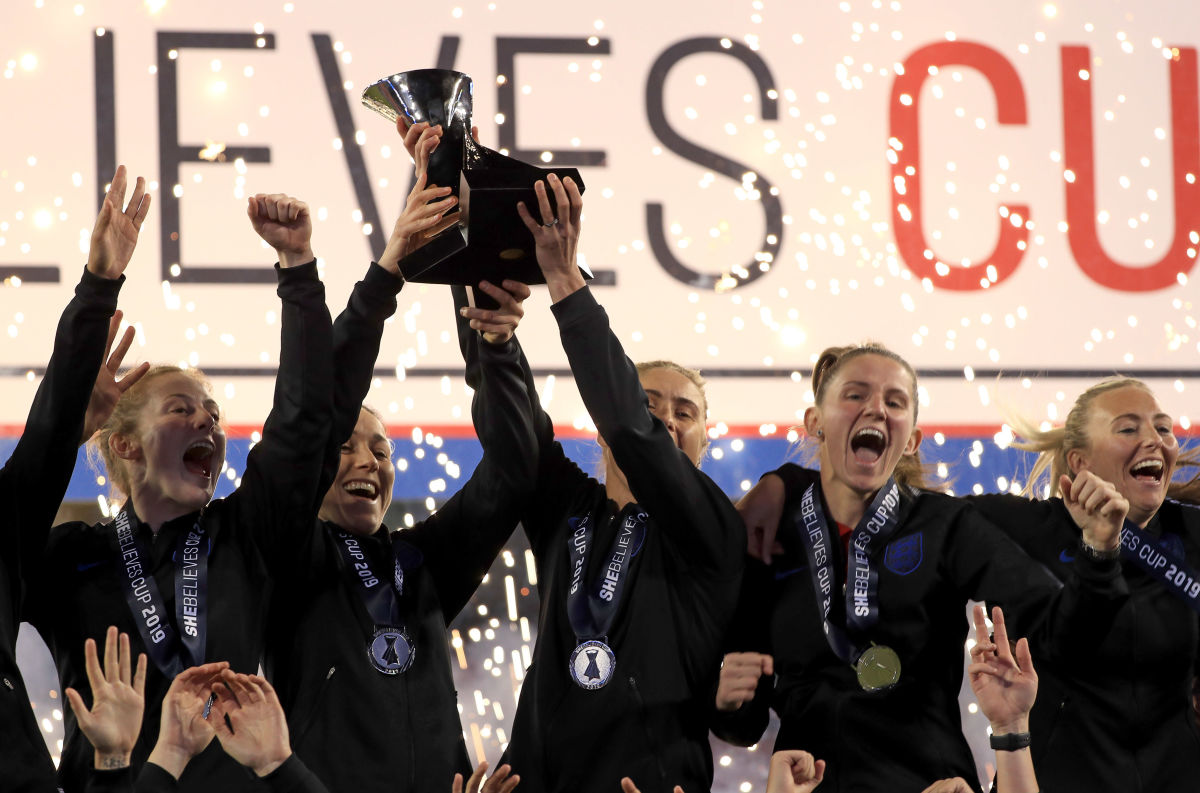SheBelieves: Jacqui Oatley Talks Breaking Into Football and Changing Perceptions of the Women's Game

90min are releasing a series of articles from some of women's football's leading figures – on and off the pitch – around the SheBelieves Cup in the US. Here...ITV Sport presenter Jacqui Oatley talks about her road into football journalism, and the evolution of the women's game.
Jacqui covered Euro 2016 and the FIFA World Cup 2018, and now covers darts for ITV and reports on football matches for BBC TV's Final Score show on a freelance basis. She'll be heading back into the TV commentary box to commentate on several matches for the FIFA worldwide television feed at this summer's FIFA Women's World Cup.
I was lying on the sofa, off sick from school. This was in the days before remote controls, so I left whatever was on the TV on when I was feeling a little lazy. On came a game of football, and I was captivated. I loved all sport but something inside me just clicked and I thought...this is the sport for me.
It was a bit of a strange introduction, but I think sometimes there’s just something innate inside you where you have an inclination towards something. Football was it for me. From then on, and maybe it’s a bit weird or unusual, but I became obsessed overnight. I used to race the dog and my dad for the newspaper when it came through the front door, and the following day I started reading the sports pages instead of looking at the TV guide.
I’m helping to launch a new campaign today to encourage other women to feel they belong in the football industry.#WomenInFootball
— Jacqui Oatley (@JacquiOatley) December 13, 2018
Thank you @TwitterUK for sharing my story.pic.twitter.com/c1Pyatv6r3
I saw that the local paper were talking about a club called Wolverhampton Wanderers, which was about 10 minutes from my house, and from then on I just started absorbing Wolves news. I began to watch them home and away, bought a season ticket, went on the supporters' coaches wherever they went and bought a pocket radio so I could follow the commentary at the same time.
I bought all the magazines: Match, Shoot, 90minutes, and I bought anything I could associated with the club. It was a proper obsession. My Saturdays were either spent on the terraces or glued to the radio, alongside Teletext page 303 for all the goals. Whenever I was at home listening to the radio, I used to record the goal updates and create my own goal reports. I did all this without ever knowing it was possible to have a career working within football.
I loved all sport but something inside me just clicked and I thought...this is the sport for me.
It’s a different world now. It feels like as fans, we almost have a sense of entitlement. Now if a game that you want to watch live isn’t on TV, you almost panic and think ‘WHAT AM I GOING TO DO?!?!’ I follow everything on Twitter, I have all sorts of goal notifications on, I follow all of the live reports so I can still build up a jigsaw puzzle picture of what’s happening, so I feel like I know a Wolves game without even being there!
My friends used to think my obsession was all very strange. They used to be convinced that, given that we attended an all girls school, I was just into football as a way to pull boys! That was completely not the case; I just loved football.
With hindsight, what I really needed during my school years was just one teacher to turn around and say to me, “Jacqui you love football, you watch it, talk about it, write about it and read about it all the time...have you considered a career path here?” Instead, I went to a careers chat with a teacher who kind of tried to put me in my place. He said something to the effect of, “You do realise you’ll never be a football manager, don’t you?”
I just went bright red and said “yeah of course...” and that was it. That was the end of the conversation and the end of any possibility of me turning my passion into a career.

It wasn’t until I was 27 that I started to change that. I was playing football, still watching Wolves, still travelling all over the country enjoying games when I dislocated my knee and couldn’t play anymore. At that time, I needed to know whether there was any other way I could stay involved with football. I was at a crossroads in my life – not enjoying my current job – and thought, maybe it’s time to chase my dream of being a 5 Live sports reporter?
I did a huge amount of research on the internet about other people’s career paths and trajectories, what they did to get into reporting and how they found themselves in the fortunate position of working in that field.
I filled every spare minute from then on doing evening courses, hospital radio and print journalism courses. After six months of doing everything I could to make some headway, I heard about a local restricted licence station that had started up in Hammersmith near where I was working and they offered me a a sports show to present for three weeks. That was all the motivation I needed.
I gave up my job, gave up my flat and went to go and present a sports show there for three weeks. I loved it...I just needed to work out how I was going to get some income.
I spent the summer crashing on friends’ floors, carrying a bag around with a duvet in and just going wherever would have me for a day here and a day there. I wasn’t just going to be able to jump into a job, so I tried to find a place on a course and managed to get myself onto a course at Sheffield Hallam University.
The #SheBelievesCup is here! This is all you need to know about it... 🏆
— 90min (@90min_Football) February 26, 2019
Who are you backing to win? 🇺🇸🏴🇧🇷🇯🇵 pic.twitter.com/kSCHsMoZTj
As soon as I got there, I managed to get an in at BBC Leeds and made their non-league football patch my own very quickly. I wasn’t getting paid for any of that extra work, but I just loved doing it. One thing led to another, and the harder I worked the more opportunities came up. I turned down a news job at BBC so that I could stay in sport, and I just kept going until I could get a good amount of work.
I had never had anything in my life that I truly worked hard at. I found it difficult to really focus on essays and school work, and I’d never linked the idea of your passion becoming your work. I met Eleanor Oldroyd, who was kind enough to come in to be interviewed during my three week work stint on restricted license radio, and I was just bowled over by her. She was so helpful and so kind, and showed me around the TV centre sports room.
I decided to try and work my way up from the very bottom. I took every single rung on the ladder that I could, taking any work seven days a week, day and night, every day of the year. I think everything put together just meant that opportunities and doors opened eventually and everything fell into place.

I went from hospital radio to a news journalism postgrad, to working for the BBC locally, and then 5 Live. TV came along later and unintentionally, but I now do both, which is great! I was doing commentaries for 5 Live and Sports Extra when I was asked to do one game for Match of the Day. It was a fairly common thing to happen to 5 Live commentators – being offered a TV game – but it caused something of a furore because a female had never done it before.
It was an incredibly uncomfortable and unpleasant thing to be the centre of such attention. It had never really occurred to me that it would be the case and that people would react in the way that they did and there would be such an outburst of negativity a few days in advance. But that’s life. It’s something I try to teach my kids now, that life is about how you manage to overcome the challenges that are put in your way.
I’m a big believer in the idea that you can turn any situation into a positive and use it to learn from. Even if things go well you can always improve. I kept going after my first game, and did several more. As for TV presenting, I remember being six months pregnant with my first child when I was asked to present the sport on the BBC News channel. After I had my baby, I started presenting the women’s football and started to do more and more TV work.
I was heavily involved in the Women’s Football Show, which I absolutely loved and was very passionate about. Then one day I received a call out of the blue from ITV offering me a contract to host international football, including the World Cup and the Euros as well as the darts – something I couldn’t turn down.
Back inside in the warmth now! We’re ready to go with UK Open finals day on @ITV4. On air any moment.... #darts 🎯 pic.twitter.com/xA53C45bmS
— Jacqui Oatley (@JacquiOatley) March 3, 2019
I carried on doing the women’s football show for another couple of years, until they moved in a different direction. I had lived through an era in which women’s football was seen as a national joke. Not an international joke, because people didn’t sneer at the women’s game in America and Scandinavia, where they took it incredibly seriously and respected the players as athletes.
I grew up in an era where you had one game of women’s football every year. You had the likes of Richard Keys and Andy Gray laughing their heads off because there was a goalmouth scramble in a cup final and they judged women’s ability to play football on one televised game a year – that was the women's FA Cup Final.
In the meantime, the players that were trying to improve the game were training on the most horrendous pitches, with rubbish facilities, in the mornings and evenings because they were also working full time. Yet for some reason people were comparing them to the men’s game. The goalkeepers, for example, were never given a professional goalkeeping session in their entire lives. People like Faye White (and Sue Smith) grew up not even knowing there was an England Women’s football team. That’s what we were dealing with.
🗣 "I want to get better, I want to improve, I want to do whatever I can to be a good role model. I want the same things for the women’s game."
— 90min (@90min_Football) March 6, 2019
✍ @JordanNobbs8 on talks about her progression and continually bouncing back! 💪 #SheBelieves https://t.co/WKnLwxHk2D
Having been at 5 Live for a couple of years, I got an opportunity to cover the England Women in 2004 and it really became a labour of love. There was no one else working on it for BBC at the time so I made it my mission to find out when the fixtures were and put them in the BBC 5 Live diary, then ask the boss if I could go and report on them. It was just so different back then. Often you couldn’t even get a line in a sports bulletin because it was deemed not newsworthy enough.
I’m not blaming anybody, but it was just a very different world. The real difference has been that now the players have turned professional. Once you have a better product, better coaching, a better standard, and the players are fitter, of course then you can play in better stadia, in front of more fans, with a higher standard of play.
Of course then TV and broadcasters will start to be interested too. It’s been a battle and a really gradual process. There’s still a long way to go but at least we’re so much further ahead than where we were. We’re a world away from where the game should be, but as long as we’re heading in the right direction, which I believe we are, at least that’s something.
On some level attitudes are changing, but we have to keep to making it happen, we can’t just sit around and wait.
It shouldn’t have been this hard to make progress, but there’s no point in complaining about that now. It’s more a case of how can we help to improve the women’s game even more. It’s about ensuring young girls now get the opportunities to play so that in 50 years time, we will have properly supported our young girls.
We need to make sure that youngsters have the opportunity to join clubs from an early age, play at primary school, then we’d see even more young girls get proper coaching, and the standard improve even more. Beyond that, we need to keep our fantastic players within the game once they finish their careers so that we can recycle that experience. Any role models we can retain in the game in any format is fantastic, because that experience is so vital.

There’s much wider recognition now. The younger generation are getting more opportunities at grassroots. Coaching has massively improved. The parents’ attitudes are certainly softening and improving towards girls being part of a physical sport. Careers are being developed. My daughter was telling me which team she’d like to play for within her football career – the fact she even piped up with that is amazing.
I would never have been able to do that because it was never even a consideration for me. On some level attitudes are changing, but we have to keep to making it happen, we can’t just sit around and wait. We have to keep encouraging young girls to watch and enjoy football. We have to encourage people to find out where their local WSL or Championship club is. There are so many little things we can do to buy into women’s football and bring others along with us.
We need to get everyone involved to help grow this game because it’s got so much potential and it’s so exciting to think where the sport could be in another 30 or 40 years.
